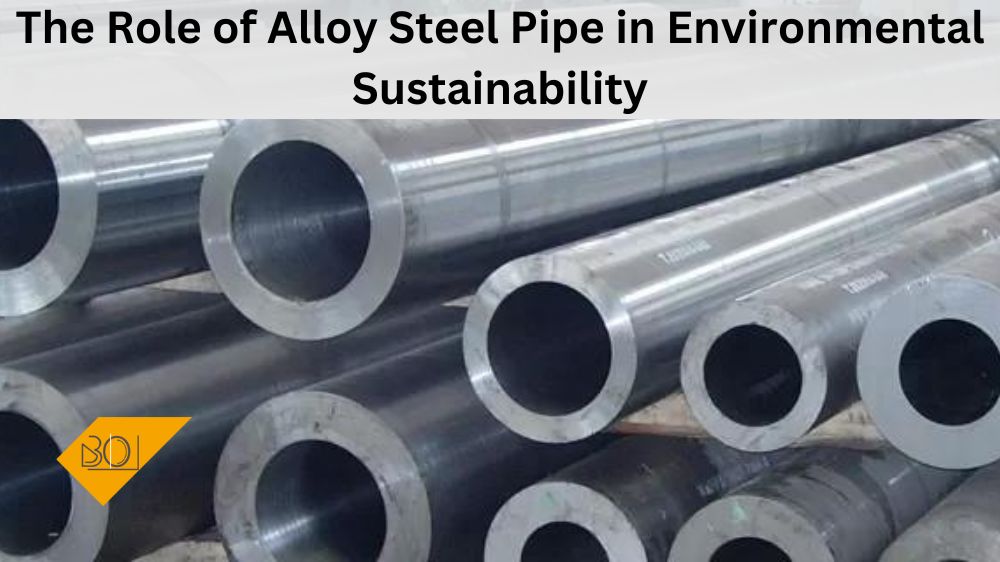Alloy Steel pipes play an important role in environmental sustainability. They are highly durable and corrosion-resistant, making them a great long-term investment for construction projects lasting decades or more. Their use reduces the need to continuously replace pipes which saves on resources like water, energy, and materials. Additionally, alloy steel pipe production produces less waste than other materials – meaning less pollution is created when manufacturing them. This helps reduce greenhouse gas emissions contributing to climate change. Overall, alloy steel pipe helps promote sustainability by reducing costs and creating fewer pollutants during production and life cycle usage.
What is Alloy Steel Pipe?
Alloy steel pipe is made from alloy steel, a combination of several elements, including iron, manganese, carbon, and other metals. Due to its specialized composition, this type of pipe is much stronger and more durable than standard steel pipes. Its superior strength makes it ideal for applications involving high temperatures or pressures and harsh environments. Alloy steel pipes are also often used in parts meant to last for extended periods, such as in constructing buildings and bridges. Additionally, they can be used in industrial settings where the metallic component must be strong enough to endure wear and tear over a long period of time.
Benefits of Alloy Steel Pipe
Superior Corrosion Resistance
Alloy steel pipe can provide superior corrosion resistance due to its high strength, oxidation, and sulfur resistance. This type of pipe has a chemical composition specifically formulated for enhanced structural properties and wear/corrosion protection. It contains higher levels of chromium, molybdenum, niobium, titanium and vanadium, which increase its ability to form protective oxide films on the surface of the metal, allowing it to resist corrosion better than traditional mild or carbon steels. Additionally, alloy steels are heat treated at high temperatures providing them with increased fatigue life and improved toughness and strength compared to lower-grade materials.
Recyclability
Another crucial environmental impact consideration in industries is the ability to recycle materials used in manufacturing. With standard carbon steel pipes, recycling is only sometimes an efficient process. However, alloy steel pipes can be completely recycled and reused without giving up their original characteristics. This reduces the need for additional raw materials and energy to create new materials, reducing the carbon footprint.
Durability
Alloy steel pipes are known for their toughness and durability. They can withstand harsh weather conditions, constant use, and high pressure. This makes them an excellent choice for petrochemical, automotive, and construction applications. By lasting longer and reducing the need for new pipes, alloy steel pipes significantly reduce waste and environmental impact.
Energy Efficiency
The smoothness and corrosion-resistance properties of alloy steel pipe translate to lower frictional forces, resulting in less energy needed to push fluids or gases through them. This makes alloy steel pipes energy-efficient and significantly reduces greenhouse gas emissions. Industries can reduce carbon footprint using alloy steel pipes as their preferred material.
Lower Maintenance Costs
Besides the environmental benefits of using alloy steel pipes, there are also economic benefits. The long-lasting properties of alloy steel pipes contribute to reducing maintenance costs. This leads to cost-saving efforts that businesses can use for other environmental initiatives.
Conclusion:
Alloy steel pipes exhibit a range of properties, making them an excellent choice for industries seeking to promote environmental sustainability. The corrosion-resistant material can help mitigate the problem of corroded, leaky pipes which pollute water sources and soils. In addition, their durability and the ability to reuse or recycle them contribute positively to the environment by minimizing waste and reducing carbon footprints. As industries and governments seek to reduce their environmental impact, alloy steel pipes play a vital role in achieving these goals. Industries can promote a cleaner, healthier earth by choosing alloy steel pipes and building a sustainable and responsible future.

